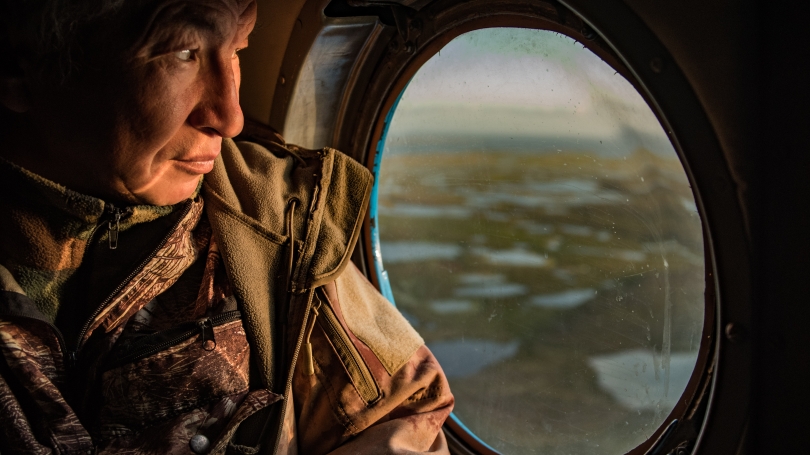"For most people," the journalist Ian Frazier wrote in his critically acclaimed 2011 book, Travels in Siberia, "Siberia is not the place itself but a figure of speech." Spanning about 75% of Russia's territory, but less than 30% of its population—with a climate known for its extreme cold—Siberia has come to symbolize exile.
A tendency to simplify Siberia extends to its history and culture. "For many outsiders," Assistant Professor of Russian Tatiana Filimonova says, "Siberia is perceived as an extension of Russia, with little attention to its ethnic groups and their histories, languages, and cultures, which have been thoroughly 'Russified' throughout the 20th century."
This spring, a new interdisciplinary course and several affiliated public events will examine Siberia through literature, film, journalistic and scholarly writing, and environmental activism in the face of climate change—with a focus on the region's Indigenous peoples and cultures. Conceived of and taught by Filimonova, Imagining Siberia is cross-listed by the Department of Russian and the Department of Native and American and Indigenous Studies.
Trained as a Russian literary scholar, Filimonova designed the course as an opportunity to expand beyond literature and the theme of exile. "The course covers what Siberia means for the Russian imagination, such as a place for criminal and political exile," she says. "But it also taps into Siberia's boundless natural resources, 20th-century Stalinist industrialization, its effect on the environment, and what both colonization and industrialization meant for its Indigenous populations."
Centering Indigenous Perspectives
"Many of Siberia's Indigenous communities are losing their languages and cultures," Filimonova says. "I want to re-center Indigenous perspectives in my teaching so that students see Siberia not just as a result of Imperial Russian and Soviet expansion but as a very complex and diverse place."
A Humanities Lab Course Development grant from the Leslie Center for the Humanities enabled Filimonova to integrate several interactive experiences into the course, including lectures by guest scholars and visits to the Hood Museum of Art, where students will work with curator Amelia Kahl to explore 20th-century photographs of Siberia and a collection of artifacts from Siberian Indigenous communities.
Additional funding from the Institute for Arctic Studies, the John Sloan Dickey Center for International Understanding, the Native American and Indigenous Studies Department, the Sociology Department, and the Russian Department support various guest speakers.
Pavel Sulyandziga, an Indigenous rights activist from the Udege community in the Russian Far East, will work with students over the course of the term to create storytelling projects about instances of Indigenous rights activism in Siberia. He will also share ritualistic objects created by his brother, a famous Siberian wood carver.
"English-language information that documents Siberia's Indigenous rights activism is scarce and often incomplete," Filimonova says. Students will narrate the stories they create at a presentation for the broader community on May 30, which will also include an exhibit of select photos and artifacts from the Hood and Sulyandziga.
On April 4 at 5 p.m., Sulyandziga will deliver a public lecture (in Russian with an English interpreter) on four case studies of environmental and Indigenous rights activism. Among cases discussed will be the Indigenous Udege community's struggle for preservation of lands and the subsequent establishment of the Bikin National Park in the Russian Far East; the attempts of the Indigenous Shor community in South-Western Siberia to preserve their village from pollution and annihilation brought about by industrial extraction of coal; and the environmental disasters surrounding the industrial mining giant NorNickel in Siberia's Taimyr peninsula.
On April 27 at 2:30 p.m., Jeffrey Kerby, an ecologist, geographer, and visiting fellow at the Institute of Arctic Studies, will present a public lecture on collaborations he has observed and fostered between scientists studying climate change in the Arctic and Indigenous communities.
"I'm really excited about how this course questions Siberia in the context of the broader Russian cultural imagination," Kerby says. "The ecology of this vast region is complex, intense, and interwoven with human stories. I look forward to discussing how a scientific perspective on the interactions between climate, plants, wildlife, and people connects to broader narratives about Russia, past and present."
On May 11 at 5 p.m., environmental and political sociologist Kate Pride Brown of Georgia Tech will deliver a lecture based on her book, Saving the Sacred Sea: The Power of Civil Society in an Age of Authoritarianism and Globalization, which examines the conflict between local and transnational environmentalists, multinational corporations, and the Russian government over the future of Siberia's Lake Baikal, the largest and oldest freshwater lake in the world. Siberia itself comprises almost 9% of the land on Earth.
Students will also gain insights in the classroom from two scholars who advocate for Indigenous voices: Varvara Korkina Williams, a Kumandin Indigenous scholar from Altai, former director of the Center for Indigenous Culture in Russia, and project manager and Arctic innovation fellow at the Institute of Arctic Studies will speak about her work supporting Arctic Indigenous women and youth. And Karina Sheifer, a research fellow in the Linguistics Department who arrived at Dartmouth from Russia in February, will talk about her work studying Indigenous languages of Siberia, and how oral traditions transmit history and culture.
For Filimonova, who joined the Dartmouth faculty in September, discovering so many community members who are actively engaging with Indigenous voices was exhilarating. "I'm grateful to be able to tap into all these resources," she says.



